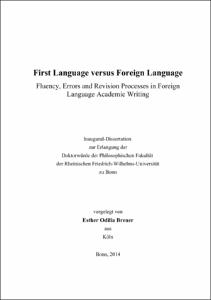First Language versus Foreign LanguageFluency, Errors and Revision Processes in Foreign Language Academic Writing

First Language versus Foreign Language
Fluency, Errors and Revision Processes in Foreign Language Academic Writing

| dc.contributor.advisor | Schneider, Klaus Peter | |
| dc.contributor.author | Breuer, Esther | |
| dc.date.accessioned | 2020-04-19T15:37:52Z | |
| dc.date.available | 2020-04-19T15:37:52Z | |
| dc.date.issued | 31.01.2014 | |
| dc.identifier.uri | https://hdl.handle.net/20.500.11811/5968 | |
| dc.description.abstract | Writing has always been the most important form of communication in academia. Since the international exchange in academia has always been vital in furthering science, a lingua franca needed to be found. English has taken over this role in the last decades. Different studies have shown, however, that writing in a foreign language is (cognitively) far more demanding than writing in the first language. In order to analyse whether and in which respects these demands have an effect on the writing processes and the written texts, a study was conducted in which German students of English philology wrote academic essays in their first language (L1) and in the foreign language (FL). In each language, they used two different planning strategies: note-taking and freewriting. The writing processes were logged with the help of key-logging software. The errors were analysed with a bilingual model of Jackendoff’s (2003) Parallel Architecture. It was expected that freewriting would help the students to activate their linguistic abilities and that, because of this the writing processes would work more fluently and the error rate would be lower. The analysis showed that the language as well as the planning methods had an effect not only on the fluency of the writing processes but also on the linguistic performance in the foreign language. Freewriting enhanced the writing fluency in both languages but the writing process worked better in L1 than in FL in both conditions. This might indicate that active thinking works better in the L1 than in the FL because of a denser phonological and semantic network. The more fluent production process did not have a positive effect on the linguistic output and the number of errors was quite high. Although most of the errors in the final FL texts were L1 induced (=node switches) in both planning conditions, the types of node-switches were different in the different planning conditions. That is, the linguistic activation via freewriting triggered the linguistic competencies differently from planning by note-taking. The analysis of the revision processes showed that the participants did not have any awareness of the L1 influence on their FL writing, and that they concentrated on basically the same aspects in L1 and in FL in the text production process. All in all, the analysis shows that the participants tend to (subconsciously) use their L1 in the writing processes to reduce the cognitive demands. The inter-individual differences of the participants’ performances additionally show that it is important to teach different writing strategies in order to help different types of writers cope with the demands of – not only – FL academic writing. | en |
| dc.language.iso | eng | |
| dc.relation.ispartofseries | Textproduktion und Medium ; 14 | |
| dc.rights | In Copyright | |
| dc.rights.uri | http://rightsstatements.org/vocab/InC/1.0/ | |
| dc.subject | Schreibprozesse | |
| dc.subject | wissenschaftliches Schreiben | |
| dc.subject | Schreiben | |
| dc.subject | Flüssigkeit | |
| dc.subject | Fehler | |
| dc.subject | Fremdsprache | |
| dc.subject | Revision | |
| dc.subject.ddc | 400 Sprache, Linguistik | |
| dc.title | First Language versus Foreign Language | |
| dc.title.alternative | Fluency, Errors and Revision Processes in Foreign Language Academic Writing | |
| dc.type | Dissertation oder Habilitation | |
| dc.publisher.name | Universitäts- und Landesbibliothek Bonn | |
| dc.publisher.location | Bonn | |
| dc.rights.accessRights | openAccess | |
| dc.identifier.urn | https://nbn-resolving.org/urn:nbn:de:hbz:5-34803 | |
| dc.relation.isbn | 978-3-631-64698-4 | |
| ulbbn.pubtype | Erstveröffentlichung | |
| ulbbnediss.affiliation.name | Rheinische Friedrich-Wilhelms-Universität Bonn | |
| ulbbnediss.affiliation.location | Bonn | |
| ulbbnediss.thesis.level | Dissertation | |
| ulbbnediss.dissID | 3480 | |
| ulbbnediss.date.accepted | 20.06.2013 | |
| ulbbnediss.fakultaet | Philosophische Fakultät | |
| dc.contributor.coReferee | Esser, Jürgen |
Files in this item
This item appears in the following Collection(s)
-
E-Dissertationen (697)




